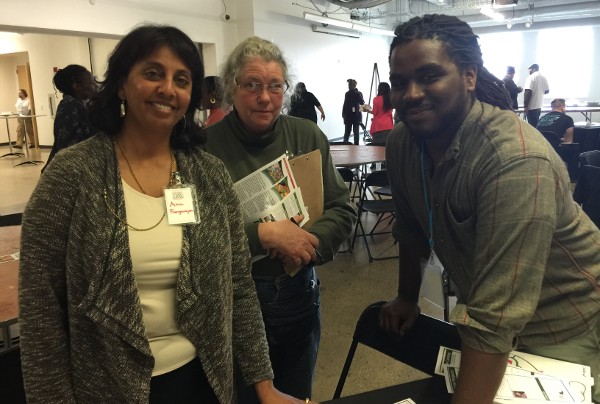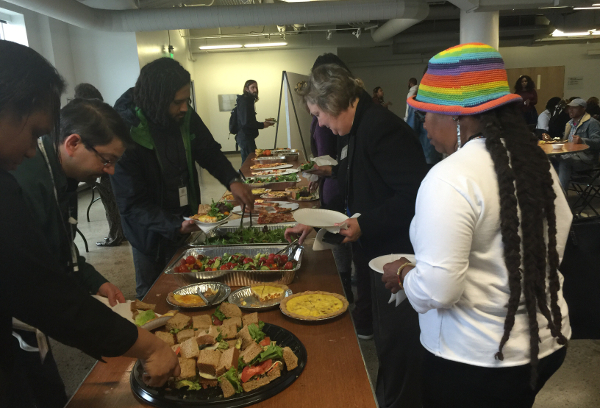7 ways to build a healthy food system in Detroit
Ideas from the sixth annual summit of the Detroit Food Policy Council, which took place last week.
Last week, the Detroit Food Policy Council’s sixth annual summit at the Benson and Edith Ford Conference Center Alfred A. Taubman Center for Design Education at the College for Creative Studies opened with a live performance of an Ojibway water song in praise of water, the creator, Mother Earth and the grandmother.
Singers: Chantel Henry, Christly Bieber, Sarah Dayson, Shiloh Maples and Rosebud Schneider of American Indian Health & Family Services.
The song set the tone for the two-day conference with the theme of “Food for Change,” as did mistress of ceremonies Devita Davison, who kicked off the sessions with a quote from activist Angela Davis that she keeps on her nightstand: “I am no longer accepting the things I cannot change; I am changing the things I cannot accept.”
Speakers emphasized taking back power from corporate food systems and entrenched interests to achieve food sovereignty and food justice for disenfranchised communities. Here’s a sampling of seven ideas, policies, and programs to transform Detroit’s food system:
1) Build strong public health infrastructure
The city of Detroit’s public health department is back, according to Detroit Department of Health and Wellness Promotion‘s new deputy director Leseliey Welch. The department is re-assuming services that had been delegated to nonprofits over the years as the city dealt with financial hardships. Post-bankruptcy, DHWP is working to rebuild its capacity to provide services in neighborhoods addressing diet-related public health challenges like obesity and infant mortality. It is also rebuilding its infrastructure to administer programs in food safety, maternal and child health, and WIC.
2) Prescribe fresh food to fight chronic disease
Dr. Richard Bryce sees the effects of a broken food system every day in his practice at Community Health and Social Services (CHASS) — everything from obesity to high blood pressure to diabetes. That’s what inspired him to start writing prescriptions for fresh fruits and vegetables.
The Fresh Prescription Program, which is run through the Ecology Center, partners with health providers at CHASS, American Indian Health and Family Services, and Joy-Southfield Community Development Corporation to prescribe fresh fruits and vegetables to low-income patients with chronic diseases. The program also connects patients to partnering farmers markets where they can “fill” their prescriptions and access nutrition counseling and cooking demonstrations. Dr. Bryce is conducting preliminary research to document the impact of the program in an effort to persuade health insurance companies to fund expansion. Thus far, he says preliminary evidence shows better long-term blood sugar control among diabetic participants.
3) Normalize breastfeeding
Breast milk is the ultimate “local food,” according to Kathryn Savoie, Detroit community health director for the Ecology Center. But factors like a father’s attitude towards breastfeeding, acceptance of family and friends, and accommodations in the workplace and in public spaces can hinder successful breastfeeding. Savoie says that if 90 percent of infants were breastfed exclusively for the recommended six months, it would save $13 billion in avoidable hospitalizations in the U.S. Savoie calls for a concerted effort of education and advocacy to make breastfeeding the norm, particularly in low-income communities where mothers often lack family support and resources.
4) Make land accessible to urban farmers
Woody Guthrie had it wrong, according to Voices for Earth Justice‘ Naim Edwards. “This land is not your land, or my land; it’s their land,” he shouts. “It’s indigenous land.” Naim calls for consideration of land as a common resource and better access to Detroit’s vast reserves of vacant and open land for Detroiters who want to grow their own food.
5) Champion culturally appropriate food
Part of a healthy food system is being able to connect to your cultural identity, according to Shiloh Maples of American Indian Health and Family Services. Her agency is working through a variety of channels, including building a community kitchen, expanding community gardens, and offering nutrition education to make Native American staples like squash, beans, and heirloom corn varieties accessible and available to native peoples in the communities served by her organization.
6) Deconstruct dominant food narratives
Lottie Spady and Victoria Goff of JustCreative LLC think one way to fight the corporate food system is to deconstruct food narratives communicated to children through advertising. To that end, the pair have worked with students to question — and dismantle — the “illusions” that corporations and the media create about what is healthy and good for kids’ bodies. JustCreative worked with 8th graders to build critical thinking skills around food advertisements, asking them to develop healthy meals for 2-to-5-year-olds in their communities based on access, affordability, local production, appeal, and nutrition.
7) Grow and serve fresh food in schools
Lunch is getting healthier in the Detroit Public Schools, thanks to efforts by the DPS Office of School Nutrition to source locally, do away with processed food, and build school gardens and an in-house processing facility. And it’s not all outdoors — students from the Detroit Institute of Technology at Cody High School are working on developing hydroponics systems for school garden projects.
To learn more about the Detroit Food Policy Council and its annual summit, click here.
Nina Ignaczak is a metro Detroit-based freelance writer. Follow here on Twitter @ninaignaczak.







